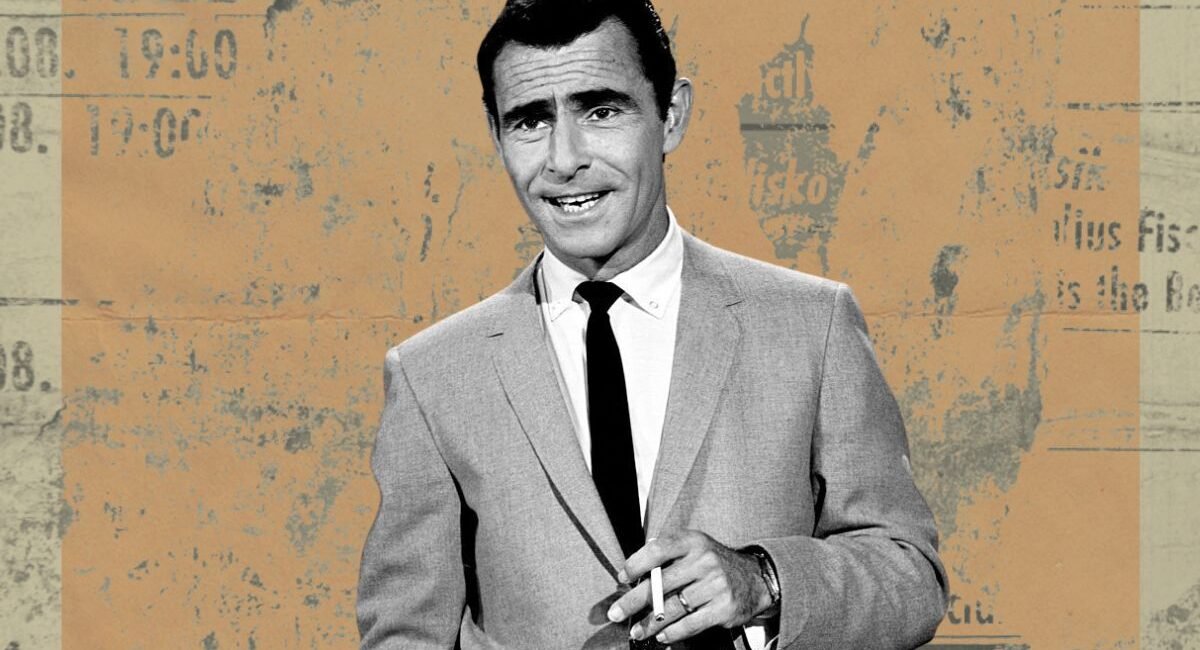
(Credit: Cayuga Productions)
Frank Zappa once offered up the portent, “Science is moving closer to weaponry, and art is moving closer to commercialism. And never the twain shall meet.” Rod Serling, who created The Twilight Zone and a string of other pioneering TV shows, however, would’ve refuted this point. It was Serling’s firm belief that, in essence, art is a comforting lie to alleviate the harsh truths of the world, and if you happen to offer up a brand that people can easily lap up in their droves then so be it—that is a feat as commendable as a work with obfuscated depth that might not conjure as much instant cash.
He voiced this belief at the point when The Twilight Zone was on a rocketing rise and other doors were being opened before him. During this period, TV producer, Herbert Brodkin offered up the rather backhanded opinion that “Rod is either going to stay commercial or become a discerning artist, but not both.” At the time, Serling’s credentials of quality were regarded in the industry, but never truly celebrated because – despite the pivotal impact we can now trace back to The Twilight Zone – his pioneering TV show was deemed a lightweight version of the artistry he seemed capable of it.
Serling didn’t see it this way, he thought he was offering up joy-giving evening entertainment for those who needed to relax and unwind. Thus, he brilliantly mused in response: “I remember the quote. I didn’t understand it at the time. I failed to achieve any degree of understanding in the ensuing years, which are three in number. I presume Herb means that inherently you cannot be commercial and artistic. You cannot be commercial and quality. You cannot be commercial concurrent with having a preoccupation with the level of storytelling that you want to achieve. And this I have to reject.”
He continued to add: “I don’t think calling something commercial tags it with a kind of an odious suggestion that it stinks, that it’s something raunchy to be ashamed of. I don’t think if you say commercial means to be publicly acceptable, what’s wrong with that? The essence of my argument,” he declared, “is that as long as you are not ashamed of anything you write if you’re a writer, as long as you’re not ashamed of anything you perform if you’re an actor… and I’m not ashamed of a television series.”
And he backed this up by openly discussing the various commercial offers he had on the table at the time. “I could have done probably thirty or forty film series over the past five years,” he said. “I presume at least I’ve turned down that many with great guarantees of cash, with great guarantees of financial security, but I’ve turned them down because I didn’t like them. I did not think they were quality, and God knows they were commercial. But I think innate in what Herb says is the suggestion made by many people that you can’t have public acceptance and still be artistic. And, as I said, I have to reject that.”
It’s a timeless notion that many artistic gatekeepers and contrarian hipsters who hoist themselves with the same contrived petard and end up on a bandwagon, all the same, could do with learning. It seems we are often driven towards increasing cynicism in the age of bipartisan social media and a lack of social collectivism in the modern age and simply accepting that art comes in all guises is worth remembering. Of course, some of it is trash, but entertainment offered up with sincerity, heart and defined intent will always be a creditable effort.
Related Topics




No Comment! Be the first one.